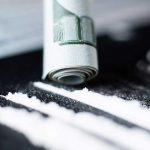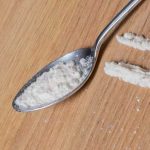Effects of cocaine use include nosebleeds, malnutrition, weight loss, drug addiction, and increased risk of cardiovascular problems.
Cocaine is a highly addictive illicit drug. Its most common form is a white powder that is snorted, smoked, or injected. Crack cocaine, a variant of cocaine, produces similar effects for a shorter amount of time. Smoking crack and snorting cocaine are risky forms of substance use.
Short-Term Effects Of Cocaine Use
Cocaine may be used to improve production, energy, and mood. It is classified as a stimulant, which increases brain activity. Since cocaine is an illicit drug, any form of cocaine use is also a form of substance abuse.
Cocaine increases dopamine levels in the central nervous system, which includes the brain and spinal cord. Dopamine is a neurotransmitter that controls motivation, reward, and memory. Short-term side effects of cocaine use may include:
- unpredictable behavior
- high body temperature
- runny nose
- dilated pupils
- nosebleeds
- chest pain
- increased heart rate
Cocaine Overdose
Cocaine’s status as an illicit drug means there is a high risk of overdose. It is often “cut” or mixed with other substances to reduce the amount of pure cocaine in each dose. Opioids are both a common and dangerous substance often cut with cocaine, including fentanyl.
The number of overdose deaths involving cocaine and opioids has increased in recent years. Symptoms of a cocaine overdose include:
- trouble breathing
- high blood pressure
- heart arrhythmia (irregular heart rhythm)
- cardiac arrest (heart attack)
- stroke
- seizure
If you see someone experiencing these symptoms, call 911 immediately.
Long-Term Effects Of Cocaine Use
Cocaine can have lasting effects on many parts of the body. Your cardiovascular and mental health are at particularly high risk for long-term cocaine use.
Cocaine can increase your risk of long-term cardiovascular conditions, like constricted blood vessels, hypertension, heart arrhythmia, heart failure, and heart disease.
Long-term cocaine abuse can lead to a decline in mental health. Symptoms range from irritability to severe psychosis and hallucinations. Other long-term effects of cocaine may include a deviated septum, malnutrition, and increased risk of hepatitis in some patients.
Cocaine Addiction
Cocaine’s effects on dopamine change the body’s natural production of the neurotransmitter. The body can become dependent on cocaine to produce dopamine while building up a tolerance and requiring high doses to get the same effects.
Stopping cocaine use after becoming dependent can cause withdrawal. Cocaine withdrawal symptoms may include:
- depression
- severe cravings
- sleeping problems
- mood swings
Cocaine withdrawal can be uncomfortable and painful, making it difficult for many people to stop taking cocaine without professional help.
Treatment Programs For Cocaine Addiction
The benefits of illicit drug use likely do not outweigh the risks, and this is especially true for cocaine. If you’re experiencing serious side effects from cocaine but are unable to stop, you may benefit from a dedicated treatment program from a healthcare provider.
Addiction treatment for cocaine often starts with a detox program, where cocaine is flushed out of your system under the supervision of health professionals.
After detox, you move on to treatment options such as withdrawal management, cognitive behavioral therapy, and referrals to support groups.
For a cocaine addiction treatment program that supports you and your family, please contact Northeast Addictions Treatment Center today.
FAQ
How Does Cocaine Affect Sex Drive?
At first, cocaine can increase your sex drive. However, after prolonged use, it can actually decrease your sex drive, lead to sexual dysfunction, and ultimately bring on sexual frustration when it becomes difficult to achieve an orgasm.
Cocaine Addiction Treatment
-
Outpatient Drug Rehab for Addiction Treatment
Taking advantage of outpatient rehab can help a person overcome the substance abuse lifestyle, while gaining access to group counseling, individual therapy and classes. People in recovery can learn skills to help manage stress...
-
Day Treatment – Partial Hospitalization (PHP)
-
Intensive Outpatient Program for Substance Abuse (IOP)
-
Evidence Based Treatment (EBT)
Sources
Written by
Northeast Addition Editorial Team
©2024 Northeast Addition Center | All Rights Reserved
This page does not provide medical advice.





